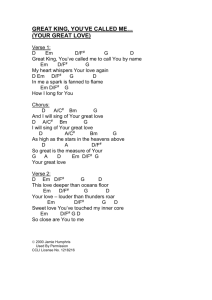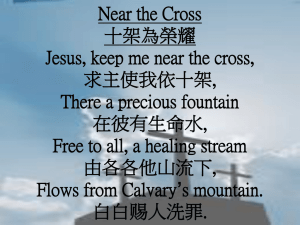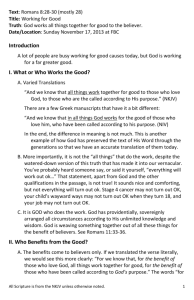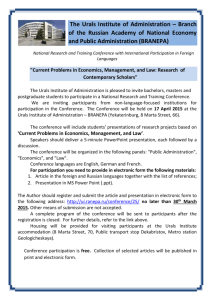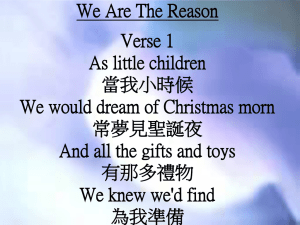Church singing and religious poem of Ancient Russia
advertisement
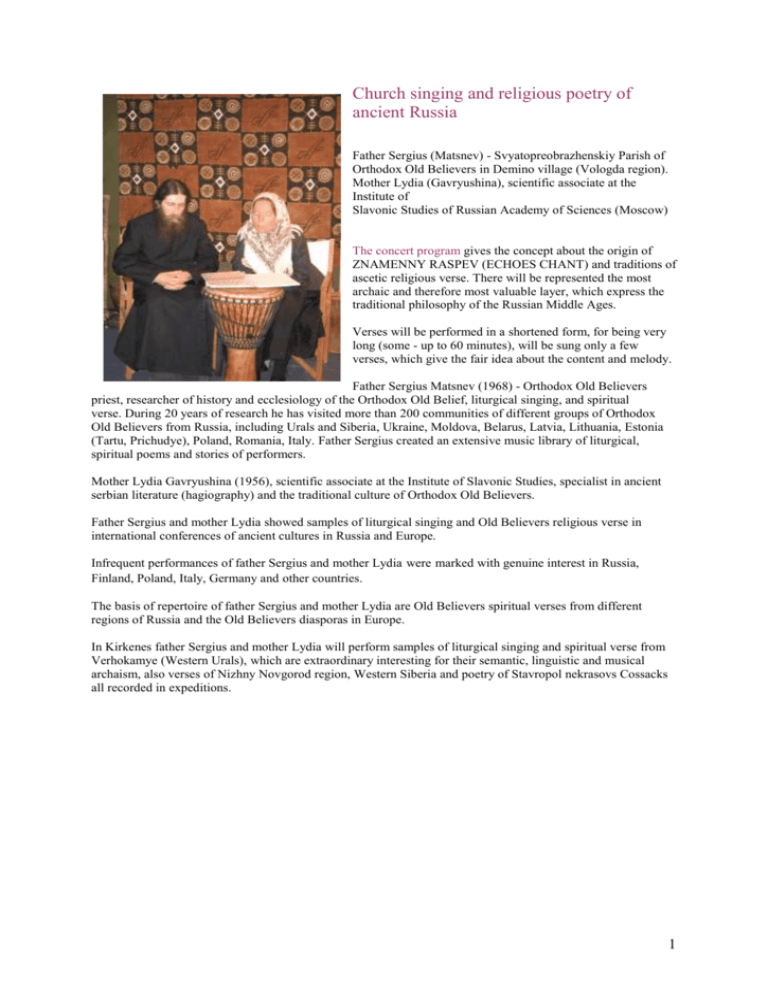
Church singing and religious poetry of ancient Russia Father Sergius (Matsnev) - Svyatopreobrazhenskiy Parish of Orthodox Old Believers in Demino village (Vologda region). Mother Lydia (Gavryushina), scientific associate at the Institute of Slavonic Studies of Russian Academy of Sciences (Moscow) The concert program gives the concept about the origin of ZNAMENNY RASPEV (ECHOES CHANT) and traditions of ascetic religious verse. There will be represented the most archaic and therefore most valuable layer, which express the traditional philosophy of the Russian Middle Ages. Verses will be performed in a shortened form, for being very long (some - up to 60 minutes), will be sung only a few verses, which give the fair idea about the content and melody. Father Sergius Matsnev (1968) - Orthodox Old Believers priest, researcher of history and ecclesiology of the Orthodox Old Belief, liturgical singing, and spiritual verse. During 20 years of research he has visited more than 200 communities of different groups of Orthodox Old Believers from Russia, including Urals and Siberia, Ukraine, Moldova, Belarus, Latvia, Lithuania, Estonia (Tartu, Prichudye), Poland, Romania, Italy. Father Sergius created an extensive music library of liturgical, spiritual poems and stories of performers. Mother Lydia Gavryushina (1956), scientific associate at the Institute of Slavonic Studies, specialist in ancient serbian literature (hagiography) and the traditional culture of Orthodox Old Believers. Father Sergius and mother Lydia showed samples of liturgical singing and Old Believers religious verse in international conferences of ancient cultures in Russia and Europe. Infrequent performances of father Sergius and mother Lydia were marked with genuine interest in Russia, Finland, Poland, Italy, Germany and other countries. The basis of repertoire of father Sergius and mother Lydia are Old Believers spiritual verses from different regions of Russia and the Old Believers diasporas in Europe. In Kirkenes father Sergius and mother Lydia will perform samples of liturgical singing and spiritual verse from Verhokamye (Western Urals), which are extraordinary interesting for their semantic, linguistic and musical archaism, also verses of Nizhny Novgorod region, Western Siberia and poetry of Stavropol nekrasovs Cossacks all recorded in expeditions. 1 Program CHURCH SINGING 1. O tebe raduyetsya (About you happy). The Hymn to the Theotokos on Liturgy of Basil the Great. Echoes chant, XVII century. 2. Bozhestva Tvoyego Spase (Divine thy Saviour). Stihera at Matins after the 50 th psalm on Transfiguration Day. Echoes chant, XVII century. 3. Svete tihiy (O Gladsome Light). From Vespers, Echoes chant, XV century. 4. Yedinorodny Syne (Begotten Son). 5-th tone. From Liturgy. Echoes chant, XV century. SPIRITUAL POEMS 5. Eastern Power of Glorious Kiev. Verse about the holy martyrs Boris and Gleb, recorded in Verhokamye (Western Urals). 6. Vo slavnom Kieve (In the Glorious Kiev). The Verse refers to the times of pre-mongol Russia, recorded in Eastern Karelia. 7. Pokaitesya lyudiye Pokaitesya (Repent, O people, repent). Apocalyptic poem, written in Verhokamye (Western Urals). 8. Komu povem pechal moyu (Whom shall I talk about my sorrow). Verses about the Beautiful Joseph, written in Verhokamye (Western Urals). 9. Vek-ot tvoy skonchevayetsya (Your life can finish suddenly). Penitential verse about proximity of death and need of repentance, written in Verhokamye (Western Urals). 10. O, prekrasnaya pustynya (Oh, beautiful desert). Verse about monastic life, recorded in Verhokamye (Western Urals). 11. Uzh polno tebe cheloveche v mire zhiti (It is enough for you to live here). Penitential verse about death and Christian preparation for it, written in Verhokamye (Western Urals). 12. Okiyan-more (Ocean-sea). Apocryphal verse, written by nekrasovs Cossacks, who migrated from Turkey to Stavropol region in 1960. 13. Raby vy moi rabyni (Slaves you my, slaves). Apocryphal verse about coming of the Antichrist, written in Verhokamye (Western Urals). 14. Pod zelenoi, pod kudryavoy (Under green, under curly). Verse about monastic life, unusual for Old Believers, not unison, but polyphonic verse, written in Kurgan city (Western Siberia). 2



